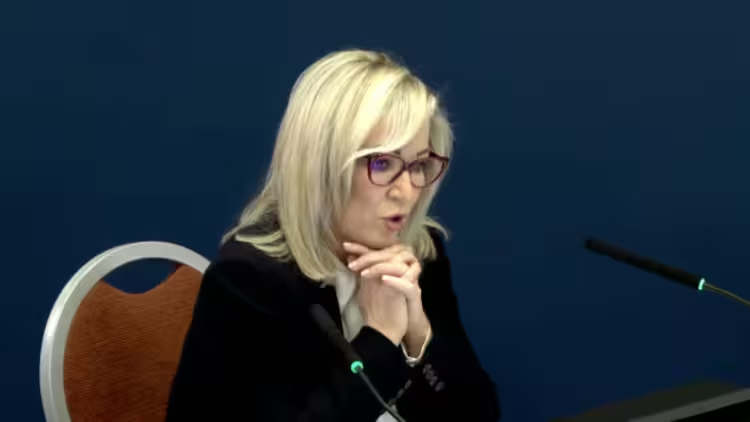By Tony O’Reilly-
Northern Ireland’s former First Minister Arlene Foster(pictured) has disclosed that the most challenging period of the Covid-19 pandemic for her was following the controversial attendance of Sinn Féin ministers at the funeral of Bobby Storey in June 2020.
This mass event, which occurred despite stringent Covid-19 protocols, sparked significant public outrage and strained political relationships.
Foster, giving evidence to the UK Covid Inquiry in Belfast, expressed that the incident led to immense internal and external pressures.
The Covid inquiry chaired by former judge and crossbench peer Baroness Hallett, began on June 28 2022 and was designed to assess Britain’s preparedness for the pandemic and learn lessons for the future. Earlier sessions have taken place in London, Edinburgh, and Cardiff.
Ms O’Neill described Stormont’s approach to the funeral by stating that the Department of Health had been “following a Boris Johnson approach that was too slow to act”
The inquiry heard Arlene Foster told Ms O’Neill in a WhatsApp exchange that she felt her “public undermining of Robin (Swann) was totally uncalled for”.
Ms Foster said: “It is hugely disappointing but unfortunately I’m not surprised”
Ms O’Neill responded in the exchange: “It’s too serious to tolerate. Lives will be lost. Start listening.”
Members of her Democratic Unionist Party (DUP) had urged her to collapse the executive in response to the breach, but she decided against such drastic action amid the health crisis. “It was a moment of maximum risk,” Foster stated, highlighting the difficulties she faced in balancing party expectations and public health needs.
The inquiry was informed of the intense discord that followed, particularly during a November 2020 Executive meeting where the DUP blocked the extension of Covid-19 restrictions using a cross-community voting mechanism.
This move came despite warnings from Stormont’s Chief Medical Officer that additional measures were necessary to prevent the health service from being overwhelmed.
The ensuing “incoherent” approach to lockdowns led to some of the highest infection rates during the pandemic.
,Baroness Foster told the inquiry she agreed with comments by Michelle O’Neill that there was “by and large no real oversight” at Stormont around planning for the early stages of the pandemic
In her testimony, Foster also reflected on the political and personal fallout from the Bobby Storey funeral. She recounted her decision to cease joint press conferences with Deputy First Minister Michelle O’Neill, describing the event as causing “massive damage” to the credibility of the Executive and public health messaging.
“It was very hurtful to so many people around Northern Ireland who had stuck by what were very stringent rules around funerals and wakes,” Foster lamented.
This sentiment was echoed in the inquiry, where it was revealed that Foster had told an Executive meeting in July 2020 that she “can’t stand” on the same platform as O’Neill following the funeral. O’Neill, however, defended her attendance, claiming there was “no dilution” of the public health message.
Further compounding the difficulties, Foster’s colleague Edwin Poots, then Stormont Agriculture Minister, made controversial remarks suggesting higher Covid transmission rates in nationalist areas. Foster acknowledged the controversy but noted Poots was “very much his own person” in terms of his opinions.
The inquiry also touched on another critical UK-wide pandemic planning meeting (COBRA meeting) in February 2020, which Foster and O’Neill did not attend, delegating Health Minister Robin Swann instead.
Foster conceded it was a mistake for the Executive leaders not to attend, recognizing the importance of such high-level discussions.




